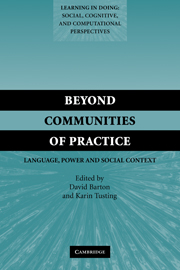Book contents
- Frontmatter
- Contents
- List of Contributors
- Series Foreword
- Introduction
- 1 Literacy, reification and the dynamics of social interaction
- 2 Language and power in communities of practice
- 3 Mediating allegations of racism in a multiethnic London school: what speech communities and communities of practice can tell us about discourse and power
- 4 “I've picked some up from a colleague”: language, sharing and communities of practice in an institutional setting
- 5 The person in the doing: negotiating the experience of self
- 6 Communities of practice and learning communities: do bilingual co-workers learn in community?
- 7 Moving beyond communities of practice in adult basic education
- 8 ‘Communities of practice’ in higher education: useful heuristic or educational model?
- 9 Communities of practice, risk and Sellafield
- 10 Semiotic social spaces and affinity spaces: from The Age of Mythology to today's schools
- Author Index
- Subject Index
- LEARNING IN DOING
- References
6 - Communities of practice and learning communities: do bilingual co-workers learn in community?
Published online by Cambridge University Press: 24 November 2009
- Frontmatter
- Contents
- List of Contributors
- Series Foreword
- Introduction
- 1 Literacy, reification and the dynamics of social interaction
- 2 Language and power in communities of practice
- 3 Mediating allegations of racism in a multiethnic London school: what speech communities and communities of practice can tell us about discourse and power
- 4 “I've picked some up from a colleague”: language, sharing and communities of practice in an institutional setting
- 5 The person in the doing: negotiating the experience of self
- 6 Communities of practice and learning communities: do bilingual co-workers learn in community?
- 7 Moving beyond communities of practice in adult basic education
- 8 ‘Communities of practice’ in higher education: useful heuristic or educational model?
- 9 Communities of practice, risk and Sellafield
- 10 Semiotic social spaces and affinity spaces: from The Age of Mythology to today's schools
- Author Index
- Subject Index
- LEARNING IN DOING
- References
Summary
In the UK, about 8% of the population use languages other than English, and some of this group may speak only a minority language. Within these families, like other families in the UK, there will be children, young people and adults with speech, language and communication difficulties/disorders. When these families seek advice and support from health professionals who do not speak the same language, then both are at a severe disadvantage. These circumstances have led a group of health professionals, speech and language therapists (SLTs), to develop the paraprofessional role of bilingual co-worker.
This chapter explores, through a case study, the communities of learning and practice for a bilingual co-worker in a speech and language therapy department. The question: Who is the bilingual co-worker's community of learning and practice? drives a critical reflection on ‘Communities of Practice’ theory (Lave and Wenger 1991, Wenger 1998) and the contributions of an Activity Theory approach (e.g., Engeström 1999) in analysing the learning practices of bilingual co-workers and their colleagues in speech and language therapy. The chapter aims to add to responses to theoretical questions about understanding “communities of practice” and “learning communities” (Eraut 2002).
I start with the work expectations and learning demands of becoming a bilingual co-worker and the professional communities where co-workers develop their professional socialisation and identity. Data are drawn from interviews with key players in these communities.
Information
- Type
- Chapter
- Information
- Beyond Communities of PracticeLanguage Power and Social Context, pp. 139 - 157Publisher: Cambridge University PressPrint publication year: 2005
References
Accessibility standard: Unknown
Why this information is here
This section outlines the accessibility features of this content - including support for screen readers, full keyboard navigation and high-contrast display options. This may not be relevant for you.Accessibility Information
- 7
- Cited by
